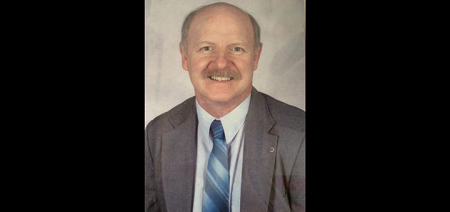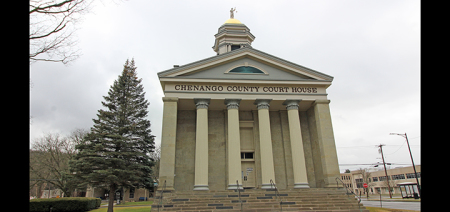Norwich Working To Become A Climate Smart Community
Published:
June 30th, 2022
By:
Sarah Genter
 City of Norwich Community Development Director Erik Scrivener has been working to get the City of Norwich registered in the New York State Climate Smart Communities program. The common council approved participating in the program during the June 21 common council meeting, and now Scrivener is working to identify past and potential future actions that would earn the city points toward becoming a certified Climate Smart Community. (Photo by Sarah Genter)
City of Norwich Community Development Director Erik Scrivener has been working to get the City of Norwich registered in the New York State Climate Smart Communities program. The common council approved participating in the program during the June 21 common council meeting, and now Scrivener is working to identify past and potential future actions that would earn the city points toward becoming a certified Climate Smart Community. (Photo by Sarah Genter)
NORWICH — The City of Norwich Common Council passed a resolution at the June 21 common council meeting to participate in the New York State Climate Smart Communities (CSC) program, where municipalities pledge to take action toward clean energy and adapt to climate change.
"The City of Norwich, in order to reduce greenhouse gas emissions and adapt to a changing climate, adopts the New York State Climate Smart Communities pledge, which comprises the following ten elements," read City of Norwich Deputy City Clerk Agnes Eaton. "Build a climate-smart community; inventory emissions, set goals, and plan for climate action; decrease energy use; shift to clean, renewable energy; use climate-smart materials management; implement climate-smart land use; enhance community resilience to climate change; support a green innovation economy; inform and inspire the public; and engage in an evolving process of climate action."
The CSC program is similar to the Clean Energy Communities program, in which the city completed action items based around clean and efficient energy to earn their designation and work toward grant funding earlier this year.
For the CSC program, the city will need to complete mandatory, priority, and pledge actions each worth varied amounts of points. Action items include things like completing a climate vulnerability assessment, creating a CSC Task Force, installing LED street lights or LED traffic signals, holding climate-related community events, performing HVAC upgrades, and dozens more.
When 120 points are earned, the City of Norwich will become a certified Clean Energy Community.
"They kind of run hand in hand, those two programs," said City of Norwich Community Development Director Erik Scrivener. "The four [actions] that the city did to become a Clean Energy Community, they also are going to go toward the Climate Smart Communities program, but they’re eligible to receive funding on that side and they’ve completed a number of things in the past. Climate Smart Communities has a lot more actions than Clean Energy, and it also requires more points."
While certification is harder to achieve for the CSC program, doing so has the potential to benefit the city through things like energy cost savings, improved air quality, reduction of flood risk, and more.
It would also give the city higher scores on certain state funding applications, such as the Department of Environmental Conservation's Climate Smart Communities Grant, thus giving them a better shot at getting funding for city projects.
"They kind of changed that program, they used to be more like a Clean Energy Direct Grant. You hit this, and you’d get this amount of money. Now there’s a Climate Smart Communities Grant Program," Scrivener explained. "You’re scored higher if you’re a Climate Smart Community, which then would give us obviously a better chance at getting money."
Plus, Scrivener said the city has already completed some actions with past projects that would earn them points and get them closer to certification. He said he's currently working with a Climate Smart Coordinator from Cornell Cooperative Extension to explore past actions and see what could be applied to the Climate Smart Community certification.
What's more, some actions can be applied to both the Climate Smart Communities program and the Clean Energy Communities program, which will increase the potential for future grants.
"There’s just a number of things that we have done and we’re looking at doing that will get us to that certification level," said Scrivener. "We’re already a Clean Energy Community, and we’re working toward becoming a Climate Smart Community. But as we do projects on each side they’ll help benefit and get points for each program, which then in turn, again, gets us more money or opportunities to apply for more money."
Council members voted unanimously to participate in the Climate Smart Communities program, and Alderman Dave Zieno, who was a big supporter of the Clean Energy Communities program, thanked Scrivener for his efforts.
"I just want to thank our Community Development Officer for moving forward with this. It’s a little bit of work but it’s a great step forward," he said.
Scrivener said next steps will be to register the City of Norwich in the CSC program, determine how many actions have already been completed by the city, and begin working on new actions that will earn them points toward designation.
Although there's a lot of work to do, Scrivener is hopeful they will earn CSC certification within a year.
"I think that we’re a little ways off from being a Climate Smart Community, but we’ll see where we’re at once we can get this tally," he said. "We are in the process of getting that [registration] submitted, and then once we’re submitted we’ll start inputting what we’ve completed and then working toward getting those old actions."
"So just things to look through, a work in progress. But I’m hoping we can get to 120 [points] pretty quick," he added. "You know, I think we could get there in a year or so. We’ll see what happens, but it all depends on what works out."
More information on the Climate Smart Communities program can be found at climatesmart.ny.gov.
Author: Sarah Genter - More From This Author
Comments








